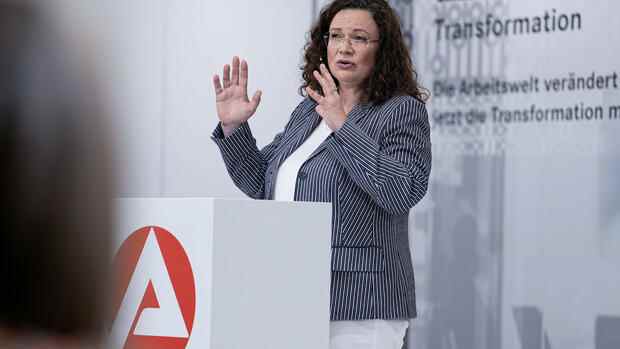The BA boss demanded that companies also give interested parties a chance “who are not among the best candidates”.
(Photo: IMAGO/Political Moments)
Berlin The President of the Federal Employment Agency (BA), Andrea Nahles, welcomed the plans of the states of Berlin and Bremen to introduce a training contribution for companies. Berlin in particular is currently “the blackest spot on the map” on the training market, because there are far more applicants for apprenticeships than there are offers. The situation in Bremen has also improved, “but not really well yet”.
The two red-red-green senates are planning a levy to use the money to provide additional support for training companies. In addition, inter-company apprenticeships may also be created.
The respective trade associations strictly reject the allocations. They refer to the “training guarantee” announced by the federal government against the shortage of skilled workers, for which there are still no concrete plans.
The background is the dramatic slump in dual training in recent years: in 2021, just 473,000 trainees started an apprenticeship – in 2007 there were still 626,000.
Top jobs of the day
Find the best jobs now and
be notified by email.
At the same time, experts point out that the energy transition in particular cannot succeed without a correspondingly large number of skilled workers.
According to the BA’s training balance for 2021/22, “the gap between supply and demand has been widening since 2016/17,” said Nahles. At the end of September there were still 68,900 unfilled apprenticeship positions – “this number has been increasing for 13 years”.
Where too few training places are offered
At the same time, however, there are almost 23,000 applicants who are still unplaced, and another almost 38,000 who have found an alternative, “but are basically still willing and ready to take up an apprenticeship position”.
A blatant example are the IT professions, in which specialists are desperately needed: According to BA data, there were around twice as many applicants as apprenticeship positions nationwide. Large numbers of apprenticeship positions remain vacant, especially in the food trades, in construction, but also in metal trades.
Nahles therefore called for “more willingness to compromise on both sides”. Companies must also give prospective customers a chance “who are not among the best candidates”. Because Germany cannot do without potential skilled workers. Young people should also find out about training opportunities outside of their “dream job”.
>> Read also: More and more young people are getting bogged down in unskilled jobs – at the same time, tens of thousands of apprenticeship positions in Germany remain vacant
If the young people have deficits, the BA can help, for example, with the instrument of “entry qualification”, a kind of state-financed long-term internship, or with “assisted training”.
Nahles appealed to politics and business to place more young people from the transition area in companies – even if they “may not always have the ideal profile of an applicant”.
The transition area refers to courses at vocational schools in which school leavers are made fit for an apprenticeship. In these courses, which include the basic vocational training years at vocational schools, “around 230,000 young people were stuck in 2021”, criticizes the DGB. In order to steer more of them into training, “but more companies willing to cooperate are needed,” said Nahles.
More: The economy makes it too easy for the training guarantee – a comment
